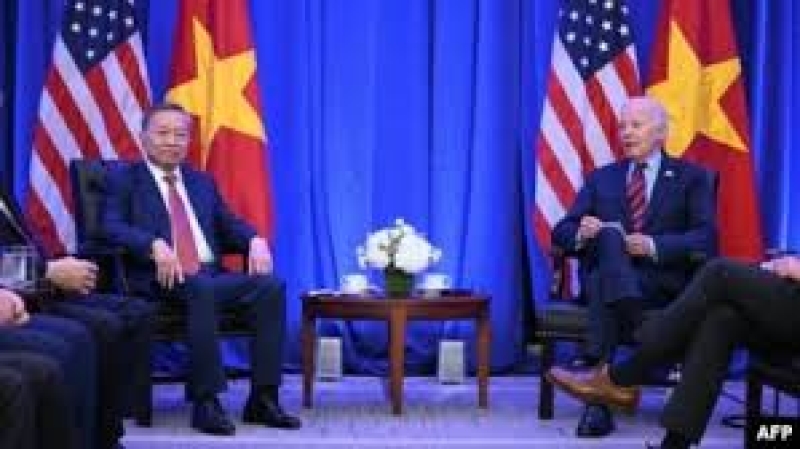- India beats Pakistan by 61 runs as World Cup scenario heats up |
- Jatiya Party routed in its fortress, Rangpur |
- Climate change cuts hilsa catch, raising long-term risks |
- Jamaat Ameer calls meeting with Tarique 'an important moment |
US, Vietnamese leaders meet, seek deeper ties

U.S. President Joe Biden says Washington is committed to a strong, prosperous, resilient, and independent Vietnam and discussed a broad range of ways the two countries can cooperate during a meeting with this Vietnamese counterpart, To Lam.
Since coming to office in May, Vietnam’s new president has been actively reaching out, meeting with the leaders of China and Russia. Washington is seeking to counter those advances and strengthen ties with Hanoi as well.
Lam, who is also head of the ruling Communist Party, met with Biden on the sidelines of the United Nations General Assembly in New York Wednesday. According to a White House statement, the two talked about “building secure and resilient semiconductor supply chains” and strengthening their tech relationship as well as progress in cybersecurity cooperation and Vietnam’s efforts to increase its digital connectivity.
Vietnam is looking to the United States and China to triple its number of subsea cables by 2030. Biden and Lam also focused on ways the two could deepen a comprehensive strategic partnership they entered last year, reports VOA.
Biden said Washington wants to cooperate with Vietnam to uphold a free and open Indo-Pacific and discussed the importance of maintaining peace and stability — especially in the South China Sea, according to the White House statement.
During the meeting, which lasted a little more than an hour, Lam assured Biden that the United States is “a partner of strategic importance,” while Biden told Lam that Vietnam is “a top partner of the U.S. in the region,” Vietnam News Agency reported.
Analysts say that while the meeting did not take place in the White House, it did highlight the high level of trust between Hanoi and Washington and the growing importance of bilateral ties.
Nguyen Hong Hai, a lecturer of international relations at Hanoi-based VinUni, told VOA in an email that the way Washington and Hanoi are talking about one another and the high importance they attach to bilateral relations is significant. It is also a sign of deepening trust, Hai added.
“Vietnam falls short of a U.S. ally. But as a partner, it is a top of its kind,” Hai said.
Hai said that Hanoi fits perfectly into Washington’s Free and Open Indo-Pacific strategy since it supports the rules-based order and is playing an increasingly bigger role in the U.S.-led global supply chain. On the other hand, Hanoi needs Washington as a regional security guarantor while its goal of becoming a developed economy with high income by 2045 is contingent on access to the U.S. market as well as its capital and technology.
Ha Hoang Hop, chair of the Hanoi-based Think Tank Viet Know, said it was significant that both leaders reaffirmed the importance of their comprehensive strategic partnership. So, too, was Biden’s commitment to support Vietnam’s tech-driven growth and encouragement for Hanoi to play an active role in regional security.
“The momentum of U.S.-Vietnam comprehensive strategic partnership will be maintained far beyond Biden’s and To Lam’s presidencies no matter who will succeed Biden next year or who will take the helm of the Vietnamese Communist Party in 2026,” Hop told VOA in an email.
The two countries recently marked the first anniversary of the comprehensive strategic partnership Biden signed with Nguyen Phu Trong, Lam’s predecessor, during a visit to Hanoi last year.
At that time, Lam was the country’s security czar. He became president following the forced resignation of President Vo Van Thuong in March and replaced Nguyen Phu Trong as party chief after Trong unexpectedly died in late July.
Lam’s first foreign trip after becoming Vietnam’s top leader took him to Beijing in August, when he and Chinese President Xi Jinping reaffirmed their commitment to bilateral ties. He also hosted Russia’s Vladimir Putin in Hanoi in late June.
Although readouts of Wednesday’s meeting gave no indication that China was discussed, Beijing was watching the meeting closely, Hai said.
China became Vietnam’s first comprehensive strategic partner in 2008, and the two countries agreed late last year to build what they call a “community of shared future” following the upgrade in U.S.-Vietnam ties.
“Any progress in U.S.-Vietnam ties is unwelcome in Beijing. However, Bejing should understand that Hanoi’s deepening ties with the U.S. is not targeted at any country but just serves its own security,” Hai said.
Think Tank Viet Know’s Ha Hoang Hop said that Beijing is “fully aware of Hanoi’s strategic position in the Free and Open Indo-Pacific strategy” and is trying to capitalize on this to serve its interests.
“For its part, Hanoi is proactively navigating between the two superpowers,” he said.

